Zu den Ebenen der Beziehungen zwischen Religionspädagogik und Politik
Überlegungen im Anschluss an die Einführung des Konzepts der ‚interreligiösen Kompetenz’ in den Curricula der Pädagogischen Hochschulen in Österreich
DOI:
https://doi.org/10.25364/10.27:2019.1.9Schlagworte:
interreligiöse Kompetenz; Pädagogische Hochschulen; Curriculum-Analyse; Österreich; Feldtheorie, interreligiöse Kompetenz, Pädagogische Hochschulen, Curriculum-Analyse, Österreich, FeldtheorieAbstract
Der Artikel präsentiert die Sekundäranalyse von Daten aus einem Projekt zur Einführung des Konzepts der ‚interreligiösen Kompetenz’ in die Curricula der Pädagogischen Hochschulen in Österreich, das in den Jahren 2016/2017 durchgeführt worden ist. Im Anschluss an Pierre Bourdieu verweisen die Autoren zunächst auf die besondere Position der Religionspädagogik an den Grenzen unterschiedlicher sozialer Felder. Auf dieser Basis unterstreichen sie, dass die konkreten Debatten um das Konzept der ‚interreligiösen Kompetenz’ im Rahmen der Curriculumserstellung an den Pädagogischen Hochschulen ohne den Rekurs auf Politik nicht zu verstehen sind. Diese Debatten sind gekennzeichnet durch eine Konfliktlage auf zwei Ebenen: (a) zwischen säkularen und religiösen Positionen und (b) zwischen konfessionellen und interreligiösen Positionen.

